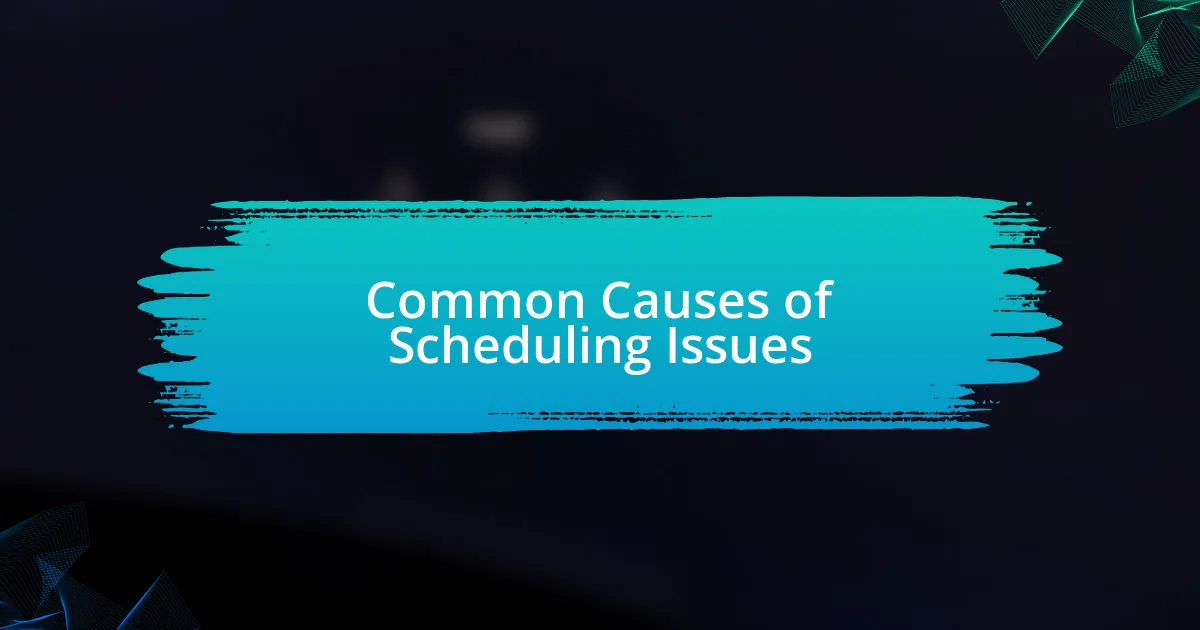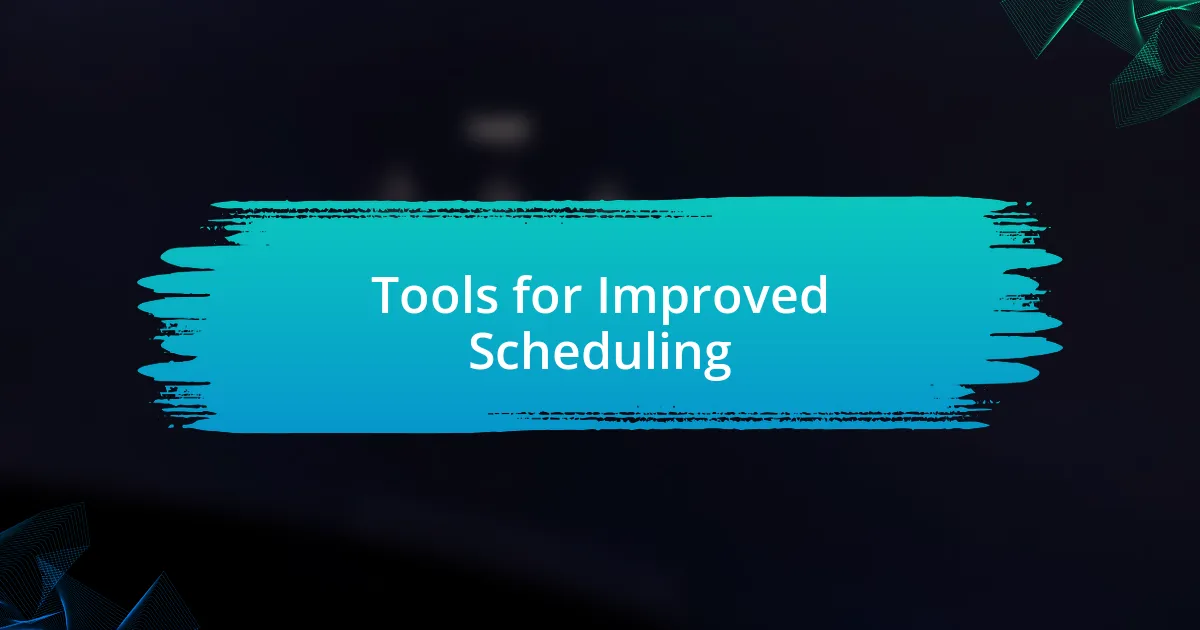Key takeaways:
- Scheduling failures are often rooted in miscommunication and unrealistic expectations, leading to delays and frustration.
- Effective time management strategies include prioritizing tasks, blocking time for specific activities, and regularly reassessing progress.
- Buffer time between tasks and aligning high-concentration work with peak energy periods significantly enhance productivity.
- Cultivating a resilient mindset involves viewing scheduling setbacks as learning opportunities and practicing self-compassion to foster growth.

Understanding Scheduling Failures
Scheduling failures often stem from a lack of clarity in communication. I remember a time when I felt certain about a meeting time, only to realize later that my colleague had a completely different understanding. It made me wonder: how many misunderstandings have I chalked up to simple miscommunication?
It’s essential to recognize that sometimes our time estimates can be overly optimistic. I once planned a project that I thought would take a week. Instead, it dragged on for three weeks due to unforeseen complexities. This experience taught me to build in buffer time for unexpected challenges.
Emotions play a significant role in how we perceive and react to scheduling failures. It’s frustrating when plans fall through, isn’t it? I’ve learned that accepting these moments as learning opportunities helps alleviate the disappointment. Understanding that failure is often a stepping stone to growth gives me the perspective needed to tackle future scheduling conflicts more effectively.

Common Causes of Scheduling Issues
Scheduling issues can often arise from unrealistic expectations. I recall a project where we underestimated how long tasks would take, believing our team could easily handle more than we actually could. The result was a cascade of delays, leaving us scrambling to meet deadlines and, frankly, feeling overwhelmed.
Here are some common causes of scheduling issues:
- Miscommunication among team members about deadlines and priorities
- Lack of clarity on task requirements or deliverables
- Overcommitment to too many projects at once
- Insufficient time allocated for unexpected challenges
- Failure to regularly reassess and adjust schedules based on ongoing feedback and progress
I’ve also noticed that external factors can influence our ability to stick to a schedule. For instance, I once scheduled a critical meeting during a busy holiday season, not considering the various personal commitments of my team members. It turned out that many had prior engagements, which led to a frustrating scramble to find a new time.

Personal Experiences with Scheduling Challenges
I’ve had my share of scheduling mishaps that taught me important lessons. One time, I organized a team brainstorming session without checking everyone’s availability. Most of my colleagues were either in back-to-back meetings or tied up with different priorities. When I walked into the conference room and found it empty, it wasn’t just disappointing; it was a moment that made me rethink how I valued everyone’s time.
Another instance that stands out to me was during a project kickoff. We set an ambitious timeline, fueled by excitement and a bit of overconfidence. As the days rolled on, it became evident that we hadn’t accounted for the learning curve that came with new software we were implementing. I remember feeling frustrated as I realized how our eagerness had led us to underestimate the resources we truly needed. I learned that taking a step back to evaluate the tools and skills my team possessed could have prevented that situation.
Reflecting on these experiences, I can’t stress enough the importance of communication and flexibility in scheduling. It’s easy to forget that life happens, and unexpected issues will inevitably crop up. I once had to reschedule a critical presentation just days before it was due because of unforeseen circumstances. I felt anxious not only about the task itself but also about how it would affect everyone involved. That was when I truly realized that adaptability is just as crucial as planning in any schedule.
| Experience | Impact |
|---|---|
| Empty Meeting Room | Realized the importance of checking availability |
| Ambitious Timeline | Learned to assess resource needs before committing |
| Last-Minute Rescheduling | Understood the value of adaptability in planning |

Strategies for Effective Time Management
When it comes to effective time management, prioritizing tasks has been a game-changer for me. I remember a project where I juggled multiple deadlines and felt overwhelmed. I decided to focus on what was most critical by using the Eisenhower Matrix, which helped me categorize tasks by urgency and importance. Suddenly, I could see clearer paths to success instead of drowning in a sea of to-do lists.
Another strategy I’ve found invaluable is blocking time on my calendar for specific tasks. At first, I resisted this structure, believing I could just go with the flow each day. However, after realizing that distractions were eating away at my productivity, I committed to dedicated time slots for deep work. Truly, protecting that time from meetings or interruptions has allowed me to dive deeper into complex issues without losing momentum.
Reflecting on my experiences, I can’t help but emphasize the need for regular reviews and adjustments in my scheduling. I once let an overly ambitious plan drag me down without reassessing progress weekly. By incorporating a simple weekly check-in with myself, I’ve developed the habit of revisiting priorities and adapting my approach, significantly reducing stress and enhancing my effectiveness. Have you ever tried something similar? Trust me, the insights gained from reflecting on your own schedule can transform your productivity.

Lessons Learned from Scheduling Mistakes
When I think back to my scheduling blunders, one of the biggest lessons was the importance of allowing buffer time between tasks. In one instance, I scheduled back-to-back meetings, thinking I could power through without a pause. However, I quickly learned that the reality was far less forgiving—running late and feeling flustered became the norm. Since then, I always carve out at least 15 minutes between commitments. It’s a simple yet transformative practice that gives me breathing room to regroup and prepare.
Another valuable insight emerged from the realization that not all tasks require the same level of energy and focus. Early on, I made the mistake of scheduling high-concentration tasks during my least productive hours, simply because I thought the time slots were free. This often left me frustrated and unproductive. Now, I’ve learned to tune into my natural rhythms. By aligning demanding tasks with my peak energy periods, I feel more accomplished and less drained. Have you ever noticed how certain times of day can either amplify or hinder your productivity?
Looking back, I also recognize that clear communication about my schedule with others is crucial. There was a time I assumed colleagues would know when I was unavailable. This led to overlapping commitments and unnecessary stress. I adopted a more transparent approach, sharing my calendar and setting boundaries for focused work. Since then, not only has my workload become more manageable, but my relationships with coworkers have also improved. Being open about my scheduling helps me maintain focus, leading to more productive collaborations. After all, wouldn’t you agree that clarity fosters respect and teamwork?

Tools for Improved Scheduling
Utilizing digital scheduling tools has transformed my approach to managing time. For example, I discovered a fantastic app that syncs my to-do list with my calendar. This integration allows me to see my tasks alongside my commitments, helping me avoid the mistakes of overbooking myself. Have you ever found yourself longing for a tool that seems to understand your rhythm?
Another pivotal resource I tapped into is time-blocking. By allocating specific block periods for tasks, I’ve found a greater sense of control over my day. I remember when I first tried this method; I allotted two hours purely for deep work. The surge of productivity during that uninterrupted time was a revelation! Are you ready to unlock your potential by trying time-blocking?
Finally, the role of reminders cannot be understated. I’ve learned not to rely solely on my memory, especially during hectic weeks. Using alarms and notifications has saved me from embarrassing last-minute scrambles. It’s incredibly satisfying to receive a nudge that prompts me to prepare instead of rushing. Don’t you think having that little extra push can make a significant difference in our busy lives?

Cultivating a Resilient Mindset
Cultivating a resilient mindset is crucial, especially when faced with scheduling failures. I vividly remember a particularly chaotic week when everything seemed to clash, leading to missed appointments and frustrated feelings. Instead of allowing that experience to derail my motivation, I took it as an opportunity to reflect and learn. Isn’t it interesting how setbacks can sometimes catalyze personal growth?
Resilience often requires a shift in perspective. After reflecting on my scheduling mishaps, I began viewing challenges as learning experiences rather than failures. This shift opened my mind to the idea that every mistake is a stepping stone toward improvement. Have you ever turned a frustrating situation into a moment of clarity? I found that each setback taught me something valuable about my limitations and strengths.
Embracing a resilient mindset also means practicing self-compassion. When I missed deadlines previously, I would berate myself harshly. However, learning to forgive myself allowed me to move forward more constructively. I now ask myself, “What can I do differently next time?” This approach not only alleviates stress but also fosters a healthier relationship with my work. How often do we forget the importance of kindness toward ourselves in our pursuit of success?

